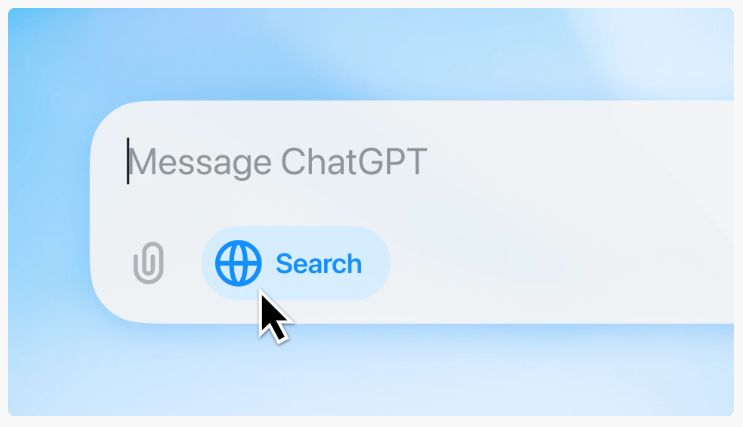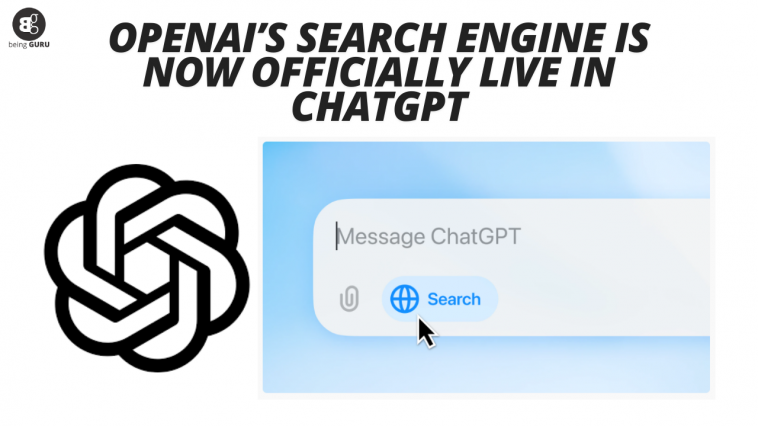Today, OpenAI has transformed ChatGPT into a live, AI-powered web search engine. The rollout begins with paid subscribers and SearchGPT waitlist users, with broader access for free, enterprise, and educational users coming soon.
Web Search Integrated Directly into ChatGPT
Rather than launching a standalone product, OpenAI has integrated web search into ChatGPT’s existing interface. The feature can intelligently decide when to pull in live web results based on the query, and users can also initiate searches manually. This update allows ChatGPT to close a key competitive gap with rivals like Microsoft Copilot and Google Gemini, which have already provided real-time internet access.

Real-Time Search Demonstration with Interactive Features
In a pre-launch demo, Adam Fry, ChatGPT’s search lead, showcased the feature. ChatGPT responded with an interactive stock graph, earnings details, and news articles with clickable citations linking back to sources when asked for Apple’s stock information. In another search, Fry looked for Italian restaurants in San Francisco, receiving an interactive map that marked recommended spots and allowed for follow-up questions, like finding “more casual and neighbourhood-y” options.
Available Across Platforms, Powered by a Fine-Tuned GPT-4 Model
This new search functionality is rolling out across all ChatGPT platforms—iOS, Android, macOS, and Windows. Built with a mix of search technologies, including Bing, the feature runs on a fine-tuned version of GPT-4. Initially launched as a prototype, SearchGPT has been tested by 10,000 users since July. OpenAI’s dedicated search team has been expanding, with talent from companies like Google.
Read more: OpenAI’s Latest Version of ChatGPT, GPT-4o, is Free for Everyone
A Step Beyond Static Knowledge Cutoffs
Previously, ChatGPT’s knowledge was limited by model cutoff dates, varying from 2021 to 2023. Live search allows real-time access to updated information, but OpenAI still plans to refresh training data regularly to ensure accuracy.
AI-Powered Search Competition Intensifies
With this release, OpenAI joins other tech giants like Meta and Google in advancing AI-powered search. OpenAI’s announcement coincided with Google’s earnings release, showing its Q3 search revenue at $49.4 billion. However, Fry clarified that OpenAI’s release was independently scheduled.
No Ads, Just Answers—But How Will OpenAI Fund Free Access?
One advantage ChatGPT offers over Google Search is an ad-free experience. While Google earns heavily from search ads, Fry shared that there are currently “no plans” for ads in ChatGPT. However, OpenAI spokesperson Niko Felix mentioned that free users will face some limits on search model usage.
Addressing Content Ownership and Media Partnerships
AI-powered search remains contentious, with lawsuits involving copyright claims against companies like Perplexity. OpenAI has also faced scrutiny, especially from The New York Times. To address these concerns, OpenAI has secured media partnerships with major publishers like Hearst and News Corp. Fry emphasized OpenAI’s commitment to responsibly using partner content and allowing publishers to opt out of its web crawler, which also respects paywalls.
Increasing Factual Accuracy in Search Results
Fry believes that live search will reduce inaccuracies, commonly called “hallucinations,” by providing access to up-to-date information. Though rare mistakes may occur, Fry assured users of OpenAI’s commitment to transparency.
Prioritizing Accuracy During Critical Times
ChatGPT’s live search is debuting just days before the U.S. presidential election, a time when accuracy is essential. Fry stated that the tool is designed to promote authoritative election information and that OpenAI is paying close attention to election-related queries.





